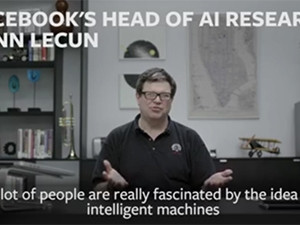
Facebook will run an education campaign on the platform to demystify how artificial intelligence (AI) works and show it is really maths and science, not magic.
The technology is already pervasive, used in smartphones, houses, banks and cars daily. Sometimes in obvious applications like Apple's voice assistant Siri, and sometimes less so, like online customer support or recommendations on music services.
The world's largest social network has released a series of videos to reveal what the future will look like when AI becomes even more prevalent. For those interested in studying AI, the videos explain what subjects to focus on.
Yann LeCun and Joaquin Qui~nonero Candela, from Facebook's AI research team, explained the technology in a blog post as: "A rigorous science focused on designing intelligent systems and machines, using algorithmic techniques somewhat inspired by what we know about the brain.
"Many modern AI systems use artificial neural networks, computer code that emulates large networks of very simple interconnected units, a bit like neurons in the brain. These networks can learn from experience by modifying the connections between the units, a bit like how human and animal brains learn by modifying the connections between neurons."
However, the researchers assure it has not reached real human intelligence and there are many problems that are inherently difficult for any computing device.
"This is why even if we build machines with super-human intelligence, they will still have limited abilities. They may beat us at chess, but not be smart enough to get in out of the rain."
LeCun and Candela say: "We have already seen how it [AI] can make seemingly magical advances in scientific research and contribute to the everyday marvel of identifying objects in photos, recognising speech, driving a car, or translating an online post into dozens of languages.
"AI is going to bring major shifts in society through developments in self-driving cars, medical image analysis, better medical diagnosis, and personalised medicine."
Forward-looking
The researchers say that although use of AI, machine learning and intelligent robots will become more widespread and 'take' jobs from humans, "there will be new jobs in manufacturing, training, sales, maintenance and fleet management of these robots.
"AI and robots will enable the creation of new services that are difficult to imagine today."
LeCun and Candela recommend students interested in pursuing a career in AI should take all the maths classes possible.
"Computer science, too, is essential; you'll need to learn how to program. Engineering, economics and neuroscience are also helpful. You may also want to consider some areas of philosophy, such as epistemology, which is the study of what is knowledge, what is a scientific theory, and what does it mean to learn," say the researchers.
They point out the goal is not to rote memorise in these classes but rather to learn how to turn data into knowledge.
"This includes basic statistics, but also how to collect and analyse data, be aware of possible biases, and be alert to techniques to prevent self-delusion through biased data manipulation."
More information and the videos can be found here.
https://www.facebook.com/Engineering/videos/10154674033412200/
Share